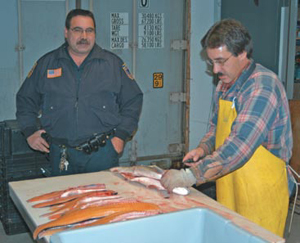Keweenaw Bay Fisheries
Consider this. If Dale and Brad Dakota represent law and order—which they do—around Keweenaw Bay, their current spin-off enterprise might include the slogan “special fish unit”—like the way networks title those everlasting television programs. Maybe, Law & Order: SFU.
The brothers from Upper Michigan, however, went with Keweenaw Bay Fisheries, specializing in the distribution of fresh, frozen and smoked Lake Superior fish. As tribal police chief and tribal judge, Dale and Brad have their hands full with public safety and the legal system by day, and processing Lake Superior fish by night—or whenever they can make time. More than five years into the venture, their overtime efforts are paying off. Even in the absence of the snazzy subtitle, SFU.
“We’re building up a pretty good clientele. People know you’ve got a good, quality product and they come back,” Brad explained as he nimbly trimmed a strip of belly fat from a fresh whitefish fillet. “We’re self-taught [filleting fish], but have gotten a lot faster over the years.”
The Dakotas nevertheless spend anywhere from two to six hours a day processing lean lake trout, whitefish and lake herring, plus taking care of general maintenance at their fish shop located just south of L’Anse. They landed the outlet by way of their father, Fred Dakota, himself a former Gichigami fisherman. The facility gleams under incandescent lights illuminating a retail storefront, processing area, and state of the art freezer.
Brad credits their 45-foot long freezer with helping expand their customer base that includes local residents, tourists, restaurants and wholesale buyers. Capable of “flash-freezing” vacuumed packed fillets to -15° F in two to four hours, the freezer enables the Dakotas to package an excellent product that is remarkably consistent over time. Metal racks allow frigid air to circulate across every surface of the packaged fish.
“The secret to freezing is how fast you can get it done. The faster, the better,” Brad said. “If you want to make any kind of money in the future, it has to be with frozen fish of high quality. You can guarantee the product every time.”
The Dakotas’ sales are about evenly split between fresh and frozen fish. Dale said some restaurants prefer fresh fish—which have a shelf life of around four days—while others seek out the convenience of flash-frozen fillets knowing the taste and texture have been preserved. Although a half-dozen tribal fishing outfits funnel a reliable supply of fish to the Dakotas’ shop, the growing demand for whitefish stretches the available stock. The late autumn fishing closure to protect spawning whitefish also creates seasonal shortages.
Testing the waters
Dale first reeled his younger brother into the fishing business in the mid-1980s working on a commercial fishing tug for a summer. The vocation was, after all, something of a family affair. Twenty years earlier—before federal courts held up Lake Superior treaty fishing—their father plied the big lake on a subsistence basis, doing his best to stay one step ahead of state game wardens that targeted tribal fishermen as “violators.”

Keweenaw Bay Tribal Judge by day, fish processor by night Brad Dakota fillets a lean lake trout. Brother and Tribal Police Chief Dale Dakota shares responsibility at their fish shop near L'Anse, Michigan.
The work for the Dakotas was both rewarding and difficult. For Brad, the prospect of being cocooned inside a tug dawn to dusk was nerve-wracking, and he focused his energies on college. Then, years later, the Dakotas found a seemingly ideal set-up in the form of a trawler refitted for trap netting. With a wide-open deck, they lifted and picked fish in the open air. But it would be a short-lived endeavor.
“We didn’t catch a lot of fish and even when we did, the prices on the wholesale market were really bad,” Brad said. An unexpected and bitter December freeze sealed the fate of four of five traps valued at around $15,000. Assisted by fisherman Cecil Peterson, the Dakotas attempted to secure the trap net lines for the winter but anchor ice hauled down the entire fishing apparatus the following spring.
“It was a hard lesson learned. At that point we really became more interested in the retail aspect of the market,” Brad said. Following the creation of Keweenaw Bay Fisheries, Dale’s son Brandon and stepson Justin came aboard to handle retail sales and prepare smoked and pickled fish.
The Dakotas said they plan on sticking with their current business structure for the foreseeable future. Only an incredible triangulation of events might get the brothers back on Lake Superior any time soon. Brad explained: “When we can’t buy enough fish and wholesale prices go up and fuel prices go down, we’ll get the boat going again.”
Those conditions present a challenging case for any law and order authorities. Even a special fish unit.
For more information contact Keweenaw Bay Fisheries at (906) 524-6767. (Article found in the 2006-2007 Winter Mazina'igan)